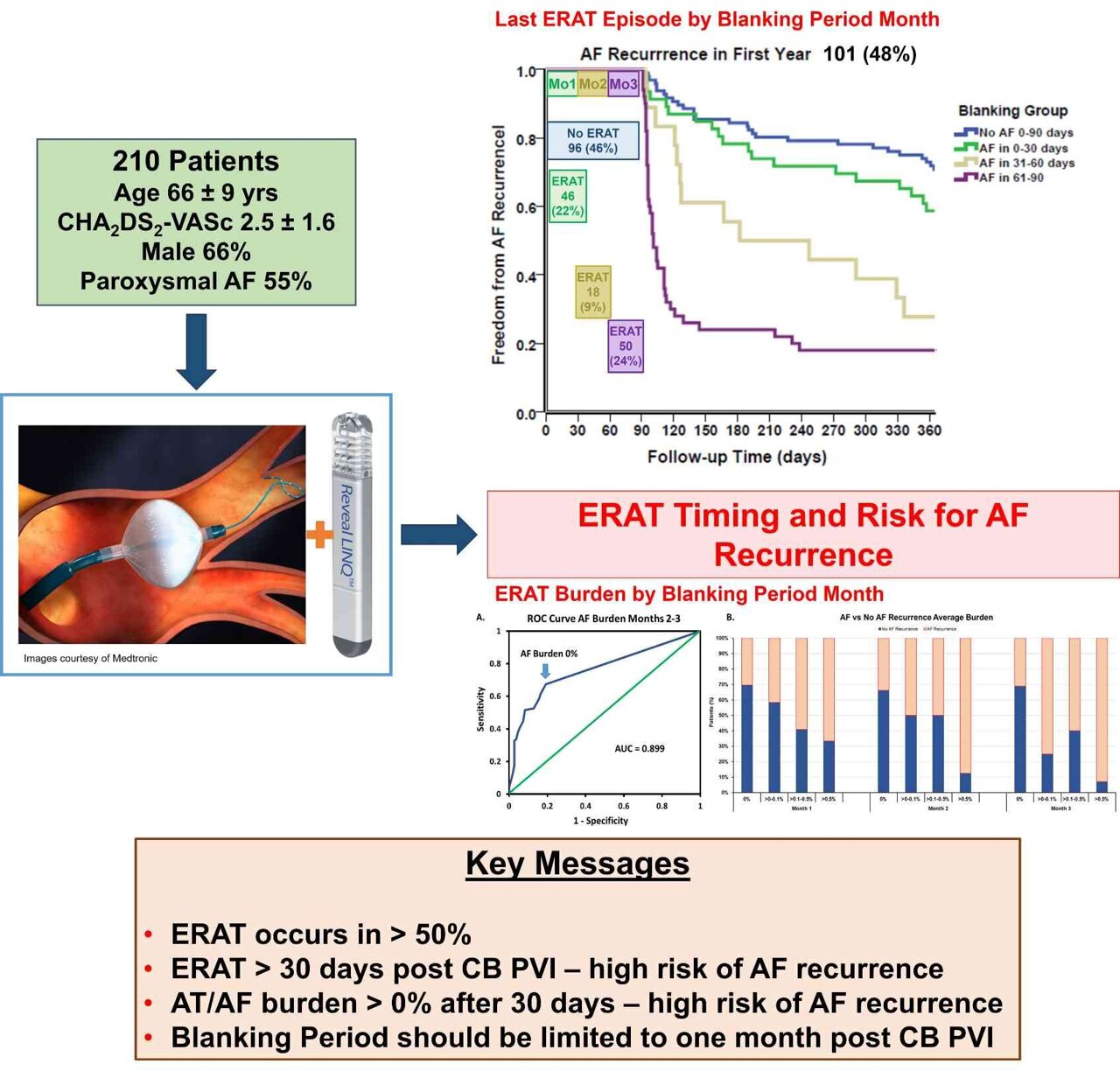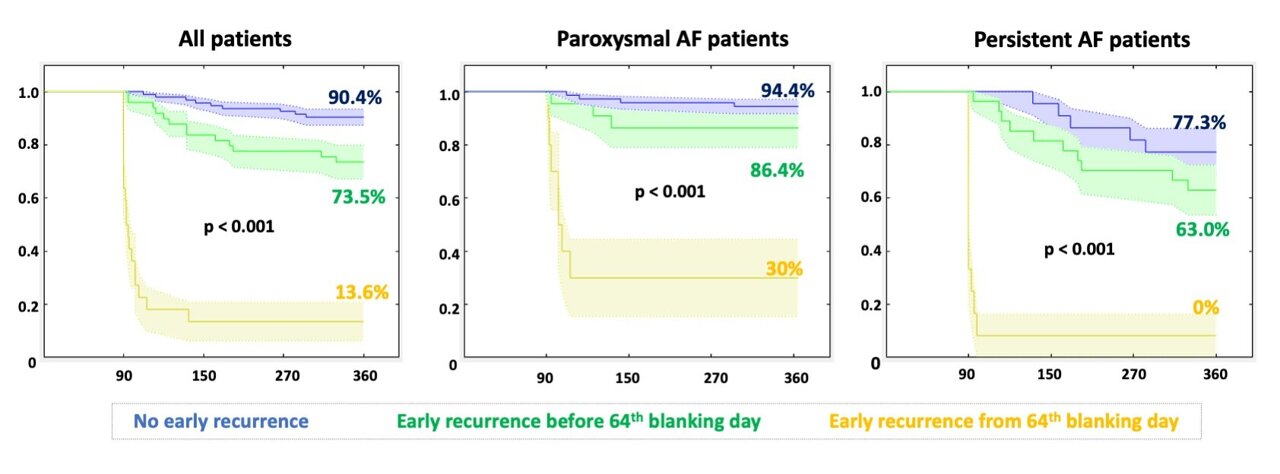
Based on continuous monitoring of early recurrence of atrial tachyarrhythmia immediately after patients have undergone atrial fibrillation ablation, Musat et al. recommend shortening the blanking period from three months to one. Credit: Dan Musat
New evidence-based research calls into question the conventional three-month blanking period immediately after atrial fibrillation (AF) ablation when early occurrences of AF are thought not to predict long-term AF recurrence. Two articles and an accompanying editorial in Heart Rhythm address the controversy and recommend shortening the blanking period.
Early recurrence of atrial tachyarrhythmia (ERAT) is commonly seen following catheter ablation of AF, with reported incidences of up to 61% in the first three months. ERAT is often attributed to transient inflammation induced by tissue damage during ablation and short-term imbalances in autonomic innervation.
This forms the physiologic rationale for the accepted convention of a three-month blanking period, during which arrhythmia recurrences are presumed to be relatively benign and not indicative of treatment failure. However, this reasoning disregards valuable data regarding early arrhythmia recurrences and their potential significance.
The authors of the editorial accompanying the two articles in Heart Rhythm call for the three-month blanking period to be reconsidered and posit that it might be time to “blank the blanking period” altogether.
Lead author Jonathan M. Kalman, MBBS, Ph.D., from the Department of Cardiology, Royal Melbourne Hospital, Australia, says, “With increasing data indicating that early AF recurrence is a predictor of late recurrence, the three-month blanking period has been called into question.”
“Although clinical trials assessing AF ablation have traditionally defined treatment success by the time to first AF recurrence, the use of such a binary efficacy outcome lacks clinical grounding and represents an oversimplification of the impact of ablative therapy.”
Lead author of the article “Defining the blanking period, using continuous ECG monitoring, after cryoballoon pulmonary vein isolation,” Dan Musat, MD, from The Valley Hospital and The Snyder Center for Comprehensive Atrial Fibrillation, Ridgewood, NJ, U.S., notes, “Multiple studies have challenged the duration of the blanking period. Our study used continuous monitoring and showed that both the timing of the last ERAT episode and the burden of ERAT show congruent results; any ERAT after the first month portends a worse outcome.”
“Our data show that the ~1/3 of patients in whom ERAT occurs and/or have a burden of >0% after the first month post-cryoballoon pulmonary vein isolation are at significantly higher risk of long-term recurrent AF. These findings lead us to consider changing the duration of the blanking period post-AF ablation to one month from the current three months.”
Co-author Suneet Mittal, MD, from The Valley Hospital and The Snyder Center for Comprehensive Atrial Fibrillation, Ridgewood, NJ, U.S., adds, “Our findings also demonstrate the value of continuous long-term ECG monitoring because information about the presence and burden of AF can help inform clinical decision-making in patients following cryoballoon pulmonary vein isolation.”
In “Early atrial fibrillation recurrence post catheter ablation: Analysis from the insertable cardiac monitor in the era of optimized radiofrequency ablation,” De Becker et al. also emphasize the importance of continuous monitoring. They compiled data from Close-To-Cure and Close Maze studies, encompassing 165 patients who underwent radiofrequency (RF) ablation for paroxysmal or persistent AF.
All patients were implanted with an insertable cardiac monitor two to three months before ablation. The study found that patients experiencing ERAT had a substantially higher risk of late recurrence, and the burden of ERAT during the blanking period was a significant predictor.
Lead investigator Benjamin De Becker, MD, from the Cardiology Department, AZ Sint Jan, Bruges, Belgium, explains, “During the blanking period, ERAT burden and ERAT occurring during the third month are independently associated with late recurrence. ERAT occurring after 64 days post-ablation was associated with a very high risk of late recurrence in both paroxysmal and persistent AF patients, suggesting that the conventional blanking period could be shortened.”

De Becker et al. recommend shortening the post-atrial fibrillation (AF) ablation blanking period in paroxysmal and persistent AF patients to two months instead of three. Credit: De Becker et al., Heart Rhythm
“A blanking period post-AF ablation is mandatory to avoid unnecessary ablation because of procedural-induced arrhythmogenicity, and to avoid the occurrence of later repermeabilization of the RF lesions, which could require further reablation.”
“Our research proposes that a two-month post-ablation blanking period would be an acceptable tradeoff, minimizing the risk of an unnecessary repeat procedure. After this two-month period, atrial tachyarrhythmia occurrence is highly predictive of subsequent recurrences.”
Professor Kalman concludes, “In light of this new evidence, a more stringent interpretation of these studies’ findings might be that the very notion of a blanking period should be reconsidered. We believe that these data support a recommendation to eliminate the blanking period.”
More information: Dan L. Musat et al, Defining the blanking period, using continuous ECG monitoring, after cryoballoon pulmonary vein isolation, Heart Rhythm (2024). DOI: 10.1016/j.hrthm.2024.02.014
Benjamin De Becker et al, Early atrial fibrillation recurrence post catheter ablation: Analysis from insertable cardiac monitor in the era of optimized radiofrequency ablation, Heart Rhythm (2024). DOI: 10.1016/j.hrthm.2024.01.020
Sohaib Virk et al, Early postablation atrial fibrillation recurrence: Time to blank the blanking period?, Heart Rhythm (2024). DOI: 10.1016/j.hrthm.2024.01.041
Provided by Elsevier
This story was originally published on Medical Xpress. Subscribe to our newsletter for the latest sci-tech news updates.
News Related-
Russian court extends detention of Wall Street Journal reporter Gershkovich until end of January
-
Russian court extends detention of Wall Street Journal reporter Evan Gershkovich, arrested on espionage charges
-
Israel's economy recovered from previous wars with Hamas, but this one might go longer, hit harder
-
Stock market today: Asian shares mixed ahead of US consumer confidence and price data
-
EXCLUSIVE: ‘Sister Wives' star Christine Brown says her kids' happy marriages inspired her leave Kody Brown
-
NBA fans roast Clippers for losing to Nuggets without Jokic, Murray, Gordon
-
Panthers-Senators brawl ends in 10-minute penalty for all players on ice
-
CNBC Daily Open: Is record Black Friday sales spike a false dawn?
-
Freed Israeli hostage describes deteriorating conditions while being held by Hamas
-
High stakes and glitz mark the vote in Paris for the 2030 World Expo host
-
Biden’s unworkable nursing rule will harm seniors
-
Jalen Hurts: We did what we needed to do when it mattered the most
-
LeBron James takes NBA all-time minutes lead in career-worst loss
-
Vikings' Kevin O'Connell to evaluate Josh Dobbs, path forward at QB
